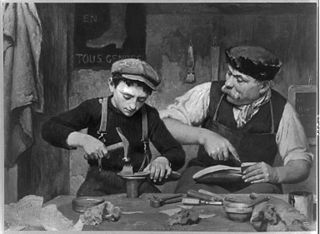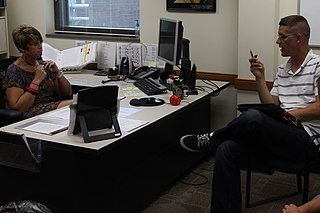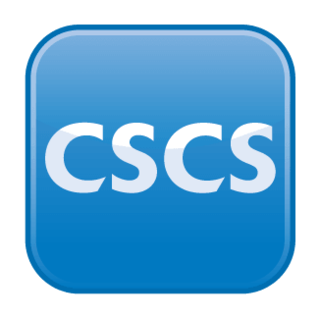European Skills, Competences, Qualifications and Occupations (ESCO) is a multilingual classification that identifies and categorises skills, competences, qualifications and occupations relevant for the EU labour market and education. ESCO has been developed by The European Commission since 2010.
ESCO v1.2 contains about 3 039 occupations, each occupation is classified according to International Standard Classification of Occupations (version 2008).
ESCO is published in the 24 official languages of the European Union as well as in Norwegian, Icelandic, Ukrainian and Arabic.
ESCO is an extension of the ISCO scheme.

Vocational education is education that prepares people for a skilled craft as an artisan, trade as a tradesperson, or work as a technician. Vocational education can also be seen as that type of education given to an individual to prepare that individual to be gainfully employed or self employed with requisite skill. Vocational education is known by a variety of names, depending on the country concerned, including career and technical education, or acronyms such as TVET and TAFE.

Apprenticeship is a system for training a new generation of practitioners of a trade or profession with on-the-job training and often some accompanying study. Apprenticeships can also enable practitioners to gain a license to practice in a regulated occupation. Most of their training is done while working for an employer who helps the apprentices learn their trade or profession, in exchange for their continued labor for an agreed period after they have achieved measurable competencies.
National Vocational Qualifications (NVQs) are practical work-based awards in England, Wales, and Northern Ireland that are achieved through assessment and training. The regulatory framework supporting NVQs was withdrawn in 2015 and replaced by the Regulated Qualifications Framework (RQF), although the term "NVQ" may be used in RQF qualifications if they "are based on recognised occupational standards, work-based and/or simulated work-based assessment, and where they confer occupational competence".

Technology education, tech ed, or career and technical education is the study of technology, in which students "learn about the processes and knowledge related to technology". As a field of study, it covers the human's ability to shape and change the physical world to meet needs, by manipulating materials and tools with techniques. It addresses the disconnect between wide usage and the lack of knowledge about technical components of technologies used and how to fix them. This emergent discipline seeks to contribute to the learners' overall scientific and technological literacy, and technacy.
Europass is a European Union initiative to increase transparency of qualifications and mobility of citizens in Europe. It aims to make a person's skills and qualifications clearly understood throughout Europe.
A national qualifications framework (NQF) is a formal system describing qualifications. 47 countries participating in the Bologna Process are committed to producing a national qualifications framework. Other countries not part of this process also have national qualifications frameworks.
Recognition of prior learning (RPL), prior learning assessment (PLA), or prior learning assessment and recognition (PLAR) describes a process used by regulatory bodies, adult learning centres, career development practitioners, military organizations, human resources professionals, employers, training institutions, colleges and universities around the world to evaluate skills and knowledge acquired outside the classroom for the purpose of recognizing competence against a given set of standards, competencies, or learning outcomes. RPL is practiced in many countries for a variety of purposes, for example an individual's standing in a profession, trades qualifications, academic achievement, recruitment, performance management, career and succession planning.
OCR Nationals are vocationally related qualifications which were officially launched by the OCR Board in September 2004. The qualifications are designed to meet the needs of those seeking vocational education in place of the traditional, theory-intensive, academic route. Although the target audience are teenagers (14-19), the qualifications are also suitable for adult learners, much like the GNVQ. The OCR Nationals are being phased out, and replaced by the Cambridge Nationals.
Esco or ESCO may refer to:

Career counseling is a type of advice-giving and support provided by career counselors to their clients, to help the clients manage their journey through life, learning and work changes (career). This includes career exploration, making career choices, managing career changes, lifelong career development and dealing with other career-related issues. There is no agreed definition of the role of a career or employment counsellor worldwide, mainly due to conceptual, cultural and linguistic differences. However, the terminology of 'career counseling' typically denotes a professional intervention which is conducted either one-on-one or in a small group. Career counseling is related to other types of counseling. What unites all types of professional counseling is the role of practitioners, who combine giving advice on their topic of expertise with counseling techniques that support clients in making complex decisions and facing difficult situations.

The Water Competences Model (WACOM) was an international project undertaken through the European Union's Lifelong Learning Programme, specifically the Leonardo da Vinci programme. It primarily deals with initial and continuing vocational education and training (VET) in the European Union. This model was established through the EQF in combination with the German Reference Model for Competence Modeling PAS 1093.
The Vocational Qualification Transfer System (VQTS) model is a proposal for a structured description of work-related competences. The core elements are the Competence Matrix and the Competence Profiles. A Competence Matrix displays competences structurally in a table according to core work tasks in a specific occupational field and the progress of competence development. Competence Profiles are formed from individual parts of this Competence Matrix. In the context of ECVET the VQTS project sought to support the transnational mobility of learners. A Competence Matrix can be used for the development of qualifications, training programmes, and job profiles, as well as for human resource planning, the allocation of qualifications to the Qualifications Framework, and for developing higher permeability between vocational education and higher education.
DISCO – European Dictionary of Skills and Competences is a structured vocabulary for the description of skills and competences in different contexts such as labour market, education, and training, and the recognition of qualifications. DISCO provides skills and competences classification that is neither linked to occupations nor to qualifications. Instead it functions as a thesaurus of skills and competences which is based on existing international standards and classifications and thus represents a terminological basis for the description of skills and competences, occupations as well as personal skill profiles and CVs, job vacancies, and job requirements or for describing curricula, courses, Diploma and Certificate Supplements or learning outcomes in general. Available in ten language versions, DISCO is meant to support transnational comparability of competences acquired in an educational or work context throughout Europe.

Diver training is the set of processes through which a person learns the necessary and desirable skills to safely dive underwater within the scope of the diver training standard relevant to the specific training programme. Most diver training follows procedures and schedules laid down in the associated training standard, in a formal training programme, and includes relevant foundational knowledge of the underlying theory, including some basic physics, physiology and environmental information, practical skills training in the selection and safe use of the associated equipment in the specified underwater environment, and assessment of the required skills and knowledge deemed necessary by the certification agency to allow the newly certified diver to dive within the specified range of conditions at an acceptable level of risk. Recognition of prior learning is allowed in some training standards.
The European Association for Technical Communication is the largest professional association for technical communication worldwide. The association connects more than 8,500 professionals like technical communicators, technical writers, and others from related fields. The working language is English.
A qualifications framework is a formalized structure in which learning level descriptors and qualifications are used in order to understand learning outcomes. This allows for the ability to develop, assess and improve quality education in a number of contexts. Qualifications frameworks are typically found at the national, regional, and international level.

The Construction Skills Certification Scheme (CSCS) is a British company that runs a training and qualification verification scheme of the same name for the British construction industry. CSCS is the leading skills certification scheme within the UK construction industry and CSCS cards provide proof that individuals working on construction sites have the appropriate training and qualifications for the job they do on site. By ensuring the workforce are appropriately qualified the card plays its part in improving standards and safety on UK construction sites. Holding a CSCS card is not a legislative requirement. It is entirely up to the principal contractor or client whether workers are required to hold a card before they are allowed on site. However, most principal contractors and major house builders require construction workers on their sites to hold a valid card.
Recreational scuba certification levels are the levels of skill represented by recreational scuba certification. Each certification level is associated with a specific training standard published by the certification agency, and a training programme associated with the standard., though in some cases recognition of prior learning can apply. These levels of skill can be categorised in several ways:
The Standard Occupational Classification, often abbreviated as the SOC, is the system used by the United Kingdom's Office for National Statistics (ONS) to classify people for statistical purposes according to their job. Under this system, a job is defined as "a set of tasks or duties to be carried out by one person". The SOC classifies jobs according to the level and specialisation of skill. The SOC was introduced in 1990. It has undergone several revisions; the latest, SOC 2020, includes nine major groups of occupations, each broken down into smaller units: there are 26 sub-major groups, 104 minor groups and 412 unit groups. The groups are designed to be as similar as possible to the International Standard Classification of Occupations 2008.